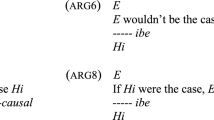Abstract
This paper takes issue with a recent proposal due to Shogenji (Synthese 184:29–48, 2012). In his paper, Shogenji introduces J, a normatively motivated formal measure of justification (and of confirmation), and then proceeds to recruit it descriptively in an explanation of the conjunction fallacy. We argue that this explanation is undermined by the fact that it cannot be extended in any natural way to the inverse conjunction fallacy, a more recently discovered, closely related fallacy. We point out that since the inverse conjunction fallacy occurs in the absence of any form of explicit evidence, formal measures of confirmation such as J, are hard pressed to apply to it at all. We then proceed to argue that this problem with Shogenji’s measure is actually quite difficult to come to terms with; even if the situations where people commit the inverse conjunction fallacy are understood in such a way that the measure is applicable, it doesn’t seem possible to reasonably interpret these situations in such a way that the measure can explain the found response pattern.
Similar content being viewed by others
References
Crupi V., Fitelson B., Tentori K. (2008) Probability, confirmation, and the conjunction fallacy. Thinking & Reasoning 14(2): 182–199
Jönsson M.L., Hampton J.A. (2006) The inverse conjunction fallacy. Journal of Memory and Language 55(3): 317–334
Shogenji T. (2012) The degree of epistemic justification and the conjunction fallacy. Synthese 184(1): 29–48
Tentori K., Crupi V., Bonini N., Osherson D. (2007) Comparison of confirmation measures. Cognition 103(1): 107–119
Tversky A., Kahneman D. (1983) Extensional versus intuitive reasoning. Psychological Review 90(4): 293–315
Author information
Authors and Affiliations
Corresponding author
Rights and permissions
About this article
Cite this article
Jönsson, M.L., Assarsson, E. Shogenji’s measure of justification and the inverse conjunction fallacy. Synthese 190, 3075–3085 (2013). https://doi.org/10.1007/s11229-012-0125-8
Received:
Accepted:
Published:
Issue Date:
DOI: https://doi.org/10.1007/s11229-012-0125-8




